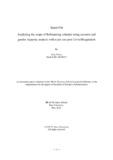| dc.contributor.advisor | Lee, Sang. H. | |
| dc.contributor.author | Fairuz, Aliya | |
| dc.date.accessioned | 2023-01-10T08:40:00Z | |
| dc.date.available | 2023-01-10T08:40:00Z | |
| dc.date.copyright | 2022 | |
| dc.date.issued | 2022-05 | |
| dc.identifier.other | ID: 18104217 | |
| dc.identifier.uri | http://hdl.handle.net/10361/17709 | |
| dc.description | This internship report is submitted in partial fulfillment of the requirements for the degree of Bachelor of Business Administration, 2022. | en_US |
| dc.description | Cataloged from PDF version of internship report. | |
| dc.description | Includes bibliographical references (pages 56-57). | |
| dc.description.abstract | Many CMSME’s were drastically affected by covid 19 due to a reduced business activity and
economic uncertainty. As operating expenses increased and the income of key customer
segments fell, these businesses were disproportionately hit. As a result, their net profits
dwindled and reducing their ability to finance their working capital and business expansion
projects. This brought in a greater need for refinancing facilities that allow these businesses to
avail loans at more affordable rates. Due to these circumstances, Bangladesh bank introduced
stimulus packages to aid such businesses and continued providing refinancing assistance to
banks, FI’s and NBFI’s. The impact of these schemes is significant upon the most vulnerable
groups of society who are unable to afford these loans normally. Yet, there are key stakeholders
who struggle in availing these facilities despite SME disbursements rising over the years. IDLC
massively focuses on reaching out to CMSME segments through their collaboration with
Bangladesh Bank. However, covid 19 also affected the capacity of such NBFI’s to expand
disbursements which only raised the existing constraints they have towards providing
refinancing schemes. This report will aim to provide comprehensive company and industry
analysis to further analyze the trends set within the SME financing segment within Bangladesh.
More focus will be placed upon examining the potential for refinancing in these circumstances
while contrasting all the analysis in a post and pre covid environment. Additionally, other tools
of SME refinancing will be compared against SME Refinancing to further analyze the potential
economic impacts. | en_US |
| dc.description.statementofresponsibility | Aliya Fairuz | |
| dc.format.extent | 57 Pages | |
| dc.language.iso | en | en_US |
| dc.publisher | Brac University | en_US |
| dc.rights | BRAC University Internship reports are protected by copyright. They may be viewed from this source for any purpose, but reproduction or distribution in any format is prohibited without written permission. | |
| dc.subject | Refinancing schemes | en_US |
| dc.subject | Gender disparity | en_US |
| dc.subject | COVID | en_US |
| dc.subject.lcsh | Sex discrimination in employment. | |
| dc.title | Analyzing the scope of Refinancing schemes using scenario and gender disparity analysis within pre and post Covid Bangladesh | en_US |
| dc.type | Internship report | en_US |
| dc.contributor.department | Brac Business School, Brac University | |
| dc.description.degree | B. Business Administration | |

